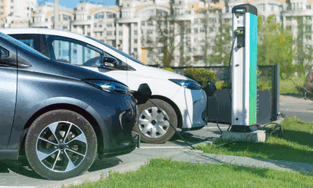 Trade Trends News
Trade Trends News
 2023-07-05
2023-07-05

In June, Toyota management called for a phased test at the automaker's research center near Mount Fuji and defined an in-depth battery technology that could help it meet its goal of providing 3.5 million electric vehicles by 2030. A strategy to commercialize solid-state battery innovations for electric vehicles by as soon as 2027.
However, these strong aspirations - from a company that offered just 38,000 electric vehicles last fiscal year - underscore the difficulties Toyota and Japanese companies face in raising their electric vehicle targets as the world looks for a more sustainable way to produce car batteries.
This comes as Japan's renewed push for electric vehicles coincides with increased efforts by the United States and its allies to reduce dependence on China for important products, including battery products.
China now manages the bulk of the electric vehicle and battery supply chain, producing 68 percent of the world's positive electrodes and nearly 90 percent of negative electrodes, according to the International Energy Corporation. The OECD estimates that China alone exported one-third of the world's lithium-ion batteries in 2017, and by 2020, that figure will reach 38 percent.
No consideration can be given to which supplies are given.In 2010, China banned exports of rare rare earths, which was a wake-up call for Japanese policymakers who have actually been trying to reduce the country's dependence on China for cobalt and nickel production. Nonetheless, China still accounts for a large portion of the smelting of these metals.
"We can't decouple from China, but we can minimize the risk by slowly reducing our dependence on China," said a senior Japanese federal government official.
In May, Panasonic President Yuki Hisamura told reporters that the electronics group would look to minimize its dependence on China by diversifying its supply chain to other countries such as Canada.
"We don't see an immediate halt to shipments of battery products from China to the United States. However, as long as the danger exists, we will need to secure supply chains outside of China."
Japan's Ministry of Economy, Trade and Industry expects domestic lithium-ion battery production capacity to reach 150 GWh/year by 2030, compared with about 20 GWh/year today.
However, to achieve this goal, Japan will need to protect 100,000 tons of lithium, 90,000 tons of nickel, 150,000 tons of graphite, 20,000 tons of cobalt and 20,000 tons of manganese annually, according to information service provider Argus Media.
Japan lacks its own rare mineral deposits and therefore needs to rely on imports by developing cooperation with other countries. However, some companies, such as Panasonic, have actually developed technology to produce cobalt-free batteries and are now considering reducing the use of nickel.
At a meeting of G-7 environment ministers in Sapporo in April, Tokyo reached out to similar countries to interact to create entirely new mines and supply chains and to recycle important minerals.
"Japan now sees the recovery of vital minerals as a critical financial issue, which is essential for financial security," said Yusuke Maekawa, senior expert at Argus Media. "This policy has the support of the G7. That's how serious their relationship with recycling is."
Panasonic intends to use recycled products for one-third of its battery components. However, battery recycling will take a long time to reach the quantities needed to produce significant results.
The cost of ecologically sound recycling is so high compared to the cost of extracting rare earth from ore in countries where guidelines are relatively low that "less than 10 percent of the rare earth fraction is recycled," says Toru Okabe, a teacher at the University of Tokyo's Institute of Industrial Science.
The availability of used batteries is another issue. Anyone can start a recycling operation," says Hans Eric Melin, director of the consulting firm Circular Energy Storage, "but what do you actually need? Well, first of all, they need feedstock. That's something that Japan doesn't have."
Melin points out that the batteries from domestic cars will eventually be used elsewhere. "It's not just because they're not a large manufacturer of electric vehicle batteries. They are large exporters of used cars, especially electric cars, and if you look at the large number of used Nissan LEAFs (electric cars) that come from Japan, those cars are on the roads of New Zealand, Russia and Kenya today."
Japanese companies do acknowledge this reality. in 2015, Nissan unveiled a strategy to lease electric cars rather than offer them in order to keep the metal in the country, and Toyota began using membership services for its first mass-produced electric car.
However, even if the cost and availability of used batteries could be addressed, Okabe says the simple reality remains that the growing demand for electric vehicles and customer electronics will outpace the growth in the number of recyclable products. As long as the former continues to grow, the latter will not be able to catch up.
That means Japan should make some tough choices and continue to buy disruptive innovations, even if, as Okabe suggests, pragmatism is needed to address near-term needs. "You need to have a good relationship with China," he said. "That will be best served."
Category
Leave Message for Demo Request or Questions


 T-info
T-info T-discovery
T-discovery

 My
Tendata
My
Tendata Market Analysis
Market Analysis Customer
Development
Customer
Development Competitor
Monitoring
Competitor
Monitoring Customer Relationship
Customer Relationship





































































































































